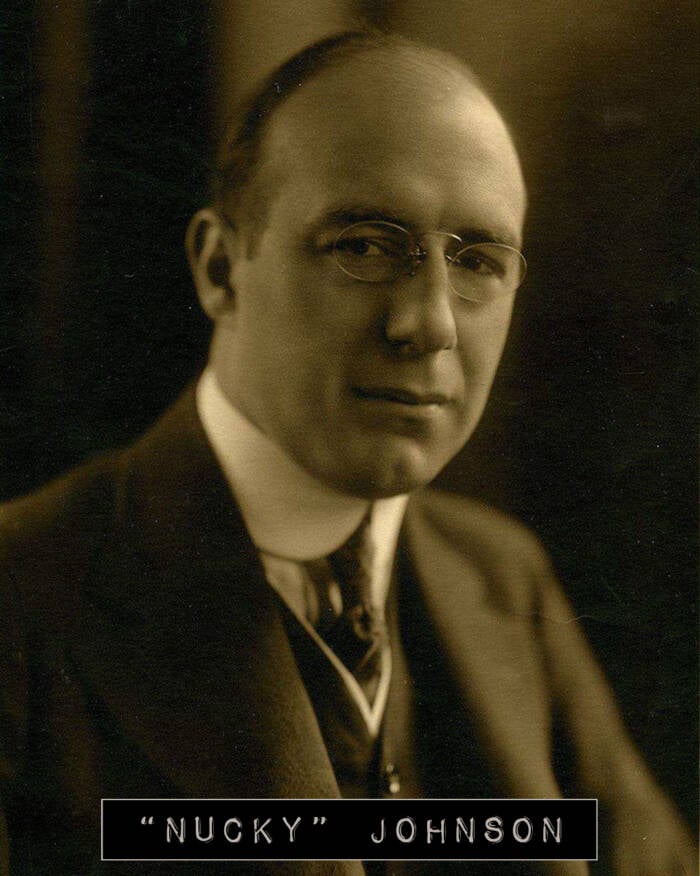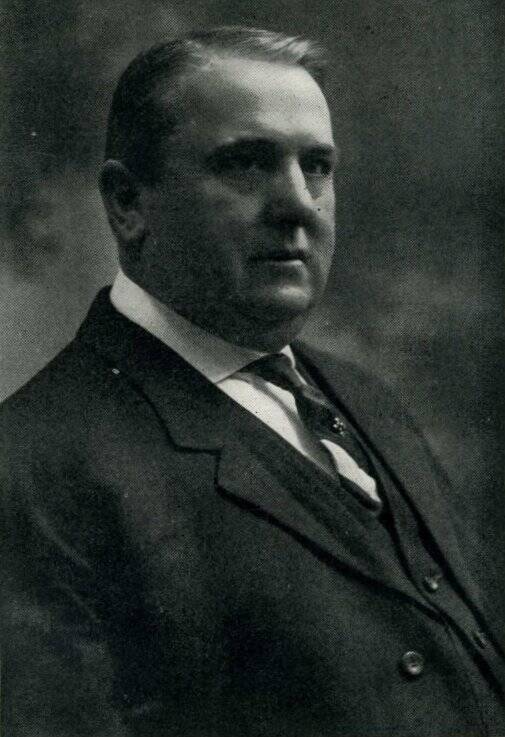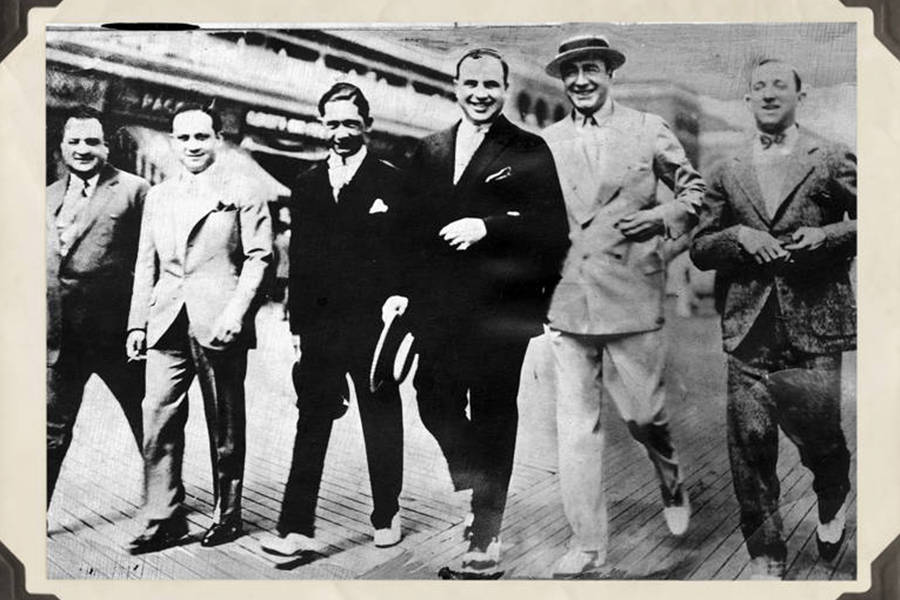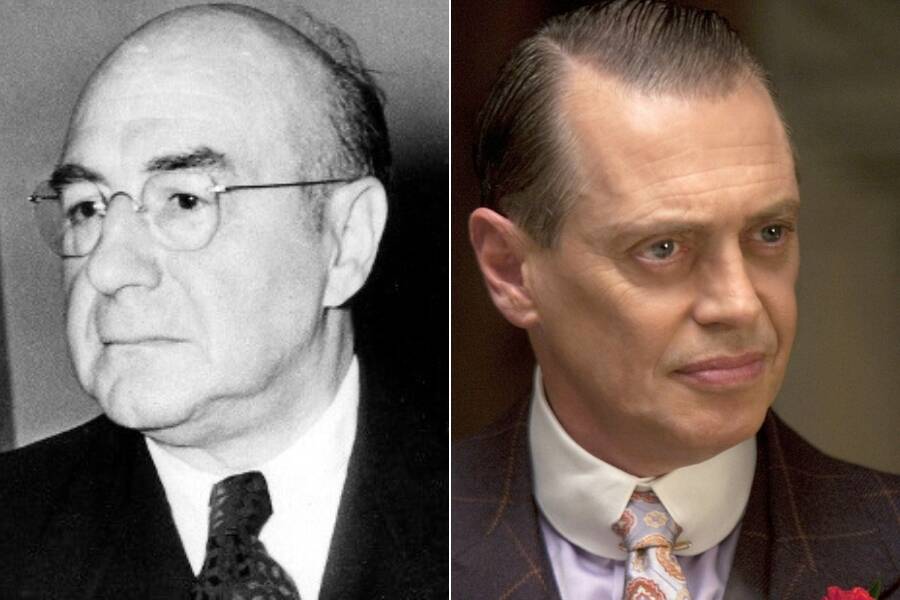Nucky Johnson ran Atlantic City in the early 20th century, using the wealth he gained from his bootlegging and casino operations to control the city’s political machine.

The Mob MuseumEnoch “Nucky” Johnson played a significant role in the development of Atlantic City, New Jersey — especially its vice industry.
Atlantic City rose to popularity by becoming “The World’s Playground” in the early 20th century. During the Prohibition era, prostitution, gambling, alcohol, and any and all other vices could be readily found in the New Jersey coastal town, provided guests had the money to pay for them. And that’s largely thanks to one man: Enoch “Nucky” Johnson.
Because of Johnson, Prohibition never really made it to Atlantic City. It was a place where people could go to drink away their troubles and gamble away their money — which proved extremely lucrative for Johnson and the men in his circle.
The wealth and influence Johnson acquired as a result of his bootlegging operations and casinos also gave him tight control over the political landscape of Atlantic City. Through bribery and favors, Johnson all but ran the local Republican machine and kept law enforcement and politicians alike in his pocket.
And with the power he gained, Johnson went on to establish his Boardwalk Empire.
Nucky Johnson’s Early Life And Rise To Power
Born Enoch Lewis Johnson on Jan. 20, 1883, Nucky Johnson was the son of Smith Johnson, an elected Sheriff in Atlantic County.
In 1905, at the age of 19, Nucky — derived from his first name, Enoch — decided to follow in his father’s footsteps, becoming his undersheriff.
In 1906, Johnson married his childhood sweetheart, Mabel Jeffries. For a time, he attended the New Jersey State Normal School (now the College of New Jersey) before abandoning his studies in favor of his political career. Then, Nucky Johnson, like his father before him, was elected Sheriff of Atlantic County in 1908. A year later, he was appointed to the position of executive secretary of the Atlantic County Republican Executive Committee.
In 1911, Louis “Commodore” Kuehnle, then the head of the Atlantic City political machine, and several others were charged with corruption — including Johnson. While Kuehnle was ultimately convicted and sent to prison, Johnson was acquitted, leaving him free to take over the city’s Republican party.

Wikimedia CommonsLouis “Commodore” Kuehnle.
In 1914, Johnson took a position as county treasurer, which granted him unparalleled access to Atlantic City’s funds. He began to grow the local vice tourism industry, promoting prostitution and permitting the service of alcohol on Sundays, all the while accepting kickbacks and corrupted government contracts.
Although he never ran for an elected political office, Nucky Johnson’s money and city government influence meant he held a lot of sway in Atlantic City politics. He is credited with helping to get multiple New Jersey governors elected.
By 1920, Johnson was already relying heavily on prostitution and gambling to drive the Atlantic City economy, making himself very rich in the process. But when Prohibition hit, Johnson saw an opportunity for Atlantic City – and himself.
How Prohibition Turned Atlantic City Into A Bootlegging Empire
Atlantic City rapidly became a major port for illegally importing alcohol on the East Coast, and it was largely thanks to Nucky Johnson and his bootlegging operations. Johnson was able to provide booze to speakeasies and clubs across the city, and before long, it became a national tourist destination for prostitution, gambling, and alcohol.
Meanwhile, Johnson took a cut of every illegal activity that took place in Atlantic City, reportedly making over $500,000 a year in the process — the equivalent of roughly $8 to 12 million today. And he used the wealth he accrued from the vice industry to exert even tighter control over the city’s politics.
But his reach extended far beyond the confines of New Jersey. As a prominent racketeer and criminal boss, he regularly did business with the Mafia, forming close ties to some of its leading members. And soon, he was exerting his influence over the mob, too.
Following the bloody St. Valentine’s Day Massacre in the spring of 1929, Johnson reportedly hosted the historic Atlantic City Conference. During this meeting, organized crime leaders like Al Capone, Bugs Moran, Lucky Luciano, and Meyer Lansky gathered in Atlantic City to settle territory disputes, consolidate and regulate bootlegging operations throughout the country, and put an end to inter-gang violence.
While much of what transpired during the conference remains a mystery, some historians say that the National Crime Syndicate was founded during these discussions.

Wikimedia CommonsNucky Johnson and Al Capone on the Atlantic City boardwalk.
The Fall Of Nucky Johnson
The end of Prohibition brought new troubles for Nucky Johnson. Bootlegged alcohol, one of Atlantic City’s main sources of income, was no longer necessary. The Great Depression also took a toll on the city’s tourism industry. Meanwhile, Johnson was facing increased scrutiny from the federal government.
Johnson had never kept a particularly low profile. Known as the “Czar of the Ritz,” he rented out the entire ninth floor of the Ritz-Carlton Hotel as his home. He was fond of expensive clothing and regularly wore a red carnation as a boutonnière. His lavish parties, limousines, and other flamboyant displays of wealth drew attention — and he also didn’t put much effort into hiding how he had made his money.
“We have whiskey, wine, women, song, and slot machines,” he once said of his beloved Atlantic City, according to the Mob Museum. “I won’t deny it and I won’t apologize for it. If the majority of the people didn’t want them they wouldn’t be profitable and they would not exist. The fact that they do exist proves to me that the people want them.”
Eventually, the feds began to crack down on Atlantic City and the leaders of its vice industry.
In 1939, Johnson was indicted for income tax evasion. He was sentenced to ten years in federal prison and fined $20,000. However, he served only four of those ten years before being paroled — and reportedly avoided ever paying the fine by taking a pauper’s oath.
Following his release, Nucky Johnson returned to Atlantic City and lived a quiet life in his final years, working as an oil company salesman. In 1968, he died peacefully in a nursing home at the age of 85.
How Does Boardwalk Empire Compare To The Real Story Of Nucky Johnson?
Nucky Johnson remains an American icon, instrumental to the creation of Atlantic City. Like many icons, his story has been retold — and exaggerated — through various fictional portrayals. Most famously, he inspired Steve Buscemi’s character, Nucky Thompson, in the popular HBO series Boardwalk Empire.

Wikimedia Commons/HBOThe real-life Nucky Johnson (left) compared with Steve Buscemi’s Nucky Thompson from Boardwalk Empire.
Like the real Johnson, Buscemi’s Nucky Thompson is a flamboyant casino kingpin and crime boss who uses his wealth and power to maintain total control over Atlantic City politics. However, the show as a whole is largely fictional, taking only loose inspiration from Nucky Johnson’s life and embellishing aspects of it for dramatic effect.
And while the series makes Nucky Thompson out to be a violent mobster willing to murder those who get in his way, in real life, there’s no evidence that Nucky Johnson ever killed anyone. Despite his ties to organized crime, he was reportedly so powerful and well-respected that he never needed to exert violence in order to build his empire.
“Johnson ruled with a velvet hammer,” the New York Times wrote in 2014. “His power was such that he never needed violence to get his way.”
After learning about Nucky Johnson, meet Frank Costello, the mob boss who inspired The Godfather. Then, meet 26 other legendary gangsters from the 1920s.





